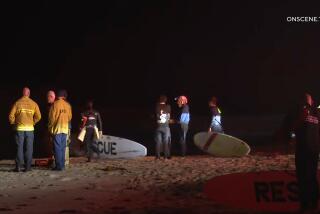Family: Student Suffered Amnesia
- Share via
A UCLA honors student who disappeared for six weeks before surfacing Sunday in Tijuana suffered from amnesia, family members said Tuesday.
Ahmad Yaseen Arain, 20, a computer-science student from Orange, vanished on his way to the campus July 23, sparking a nationwide search. Arain was in seclusion Tuesday, but family members said he recalls little of his ordeal. He wandered the streets of Tijuana and was eventually cared for by a family that took him to an Internet cafe to contact his mother once his memory began to return.
His mother, Zahida Arain, said the family doctor determined Monday that her son suffered from temporary amnesia.
Zahida Arain said her son lost more than 30 pounds. He was recovering Tuesday and was not ready to make public comments about his experience, she said.
Flowers, balloons, streamers and a welcome-back sign filled the apartment on Cottonwood Circle where Arain lives with his mother, brother and sister.
“I’m so happy,” said Zahida Arain. “We haven’t asked him too many questions yet. I’m just thankful that he’s home. It’s a miracle he’s safe and alive.”
People who forget who they are and wander away from home have a form of amnesia called dissociative fugue. Dr. Jeff Victoroff, an associate professor of neurology and psychiatry at the Keck School of Medicine at USC, said there are no reliable figures for how many people suffer from it. .
Psychiatrists said the condition can be caused by a neurological disorder, such as a brain tumor or epilepsy. More often, however, the cause is psychiatric, the onset of schizophrenia or emotional trauma.
Family members said that they knew of no traumatic event that might have trigged amnesia in Arain, although they acknowledged he was under some stress as a student. Arain’s ordeal began July 23, when his brother dropped him off at a bus station in Anaheim so he could make the trip to UCLA to meet with an academic counselor. He made several bus transfers, and a surveillance camera showed that he got off in Los Angeles. Arain, however, never arrived at school, and when he didn’t come home, his family went to police.
His family had offered a $20,000 reward for his safe return and hired a private investigator to help in the search. Arain told his family he remembered boarding a bus in Anaheim but didn’t recall how he ended up in Tijuana, or what happened to his cellphone, identification and a backpack filled with books. He remembered sitting underneath a bridge at some point during the ordeal, and said he survived by drinking out of a hose at a gas station for a month.
Two weeks ago, a Mexican family saw him sitting on the street and offered him food, clothes and a place to stay, his mother said. Arain regained some memory and on Sunday asked the family to take him to an Internet cafe. He e-mailed his mother, “I want to come home,” Zahida Arain recalled. “I don’t have any ID, just bring my passport so I can come home.”
Arain also left a phone number to contact him.
A family friend drove Arain’s mother and brother to Tijuana, where they met Arain at a taxi stand, much thinner, his skin darkened by the sun and dirt.
“It was like a dream come true,” said his brother, Sulaiman Arain, 19, a UC Irvine student. “It was the moment I was waiting for. We hugged and hugged and hugged.”
Arain and his family visited the Mexican family’s home and his mother gave them money. She would not say how much.
“For my whole life, I would be grateful to them,” she said.
More to Read
Sign up for Essential California
The most important California stories and recommendations in your inbox every morning.
You may occasionally receive promotional content from the Los Angeles Times.









